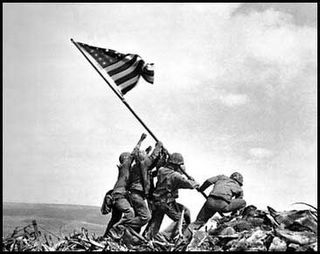In a review of blogosphere criticism of the AP's Pulitzer Prize-winning photos, Paul McLeary of the Columbia Journalism Review slams my earlier post on the subject:
Riding Sun, meanwhile, looks at the 20 winning photos and complains that they show only scenes of death and carnage, and that there are no photos showing "U.S. forces looking heroic; U.S. forces helping Iraqi civilians; Iraqis expressing support for U.S. forces or Iraqis expressing opposition to insurgents." We're all for cheery pictures, but pictures of people "expressing support" might not be the kind of dangerous, newsworthy, on-the-fly material that wins awards.McLeary's last link goes to AP photographer Joe Rosenthal's legendary, Pulitzer Prize-winning shot of U.S. Marines raising the flag atop Mt. Suribachi on Iwo Jima:
 |
Nor is it a particularly good example of "on-the-fly material". A smaller U.S. flag had already been placed atop Suribachi beforehand, but Marine commanders ordered it switched for a larger one. This second flag-raising is the one caught on film. It wasn't "posed", but Joe knew it was going to happen and carefully positioned himself for the shot.
Yet despite its lack of violence, suffering, or spontaneity, Joe Rosenthal's masterpiece is widely acknowledged to be the single greatest photograph of World War II. Some have called it the greatest photograph of all time.
Would an AP photographer take such a photograph today? Would the Pulitzer Prize Board honor it with an award?
6,821 U.S. troops, including 5,931 Marines, lost their lives on Iwo Jima. Sixty years later, this triumphant photograph reminds us of both their terrible sacrifice and their ultimate victory.
Sixty years from now, what photographs will remind us of the American troops serving in Iraq?

10 comments:
To answer your last question: I think it must be a portrait of Michael Moore as he "supports" the troops by calling for our government to have them abandon their mission.
Posted by Brian
I'm thinking more along the lines of "Leash Girl" or, my favorite from that wonderful and inspiring series, "9 Volt Nut-Sack." Unfortunatly, those are the photos that have staying power.
Posted by Bojack
Bojack, the way things are going, you may end up being proved right. I suspect we may never see a positive depiction of U.S. troops in Iraq become as widely known as the pictures of Abu Ghraib.
And I think that's a shame.
As Joe Rosenthal's picutre shows, positive images can have staying power, too. It just seems like we're not going to see many of them given the same level of exposure in today's mainstream media.
Posted by GaijinBiker
Paul McCleary is a whiny little pr*ck who is P.O.'d because bloggers have taken away Journalists' literary carte blanche . No more unchecked fictions means the job of journalism is much harder than it used to be!
I'd consider his impotent vitriol a compliment, GB.
Posted by Langtry
And BTW: I think he's just really jealous of your chopstick skills!
Posted by Langtry
You're right that prize winning photos weren't always so negative. Look at what a difference 60 years can make. What I think is most distasteful about many of the photojournalists and political cartoonists is the length taken to be negative in their portrayal of the US Military and US Policy. In the last 10 years I've gone from reading the daily local rag to not even registering online to read the drek just so they don't get any revenue from me.
Posted by Toni
A well-written entry, I must say!
Posted by Anonymous
Most of the photos you cite aren't war photos. I think there's been a clear shift in the way the US media covers war, probably starting with Vietnam.
Posted by GaijinBiker
Lex's point about "negativity" is well taken, The common element in all of the prize-winng photographs is emotion. In the Iwo Jima pic we feel that thrill of a hard-won victory so wonderflly captured and sybolized by the apparent effort to hoist the unwieldy flagpole- it really conveys a sense of urgency, valor, triumph. Contrast that with the "cowering" of the soldiers ducking fire in Fallujah or the election workers being executed by a MOB of terrorists (there were 30 terrorists who ambushed the 3 election workers but that detail doesn't come across in the photo- wonder why). How are we moved by these pictures? Defeatism, futility, vanity, how the mighty hath fallen..This what we are meant to take away from these images.
Gaijin, this is a great post, very well written.
Posted by Quid
Good point, Quid, and thanks for the compliment.
Posted by GaijinBiker
Post a Comment